Het Actiefonds is Looking for Allies
Het Actiefonds needs at least 500 new donors to meet the growing demand.
Het Actiefonds needs at least 500 new donors to meet the growing demand.
2024 is a record year. From record temperatures to an unprecedented number of requests at Het Actiefonds. On one hand, this is bad news: there are a lot of reasons to get into action. We see a global expansion of far-right governments, from Argentina to Slovakia.
We are being pitted against each other. Racist ideologies are given free rein. Additionally, we are witnessing the resurgence of military aggression for profit. People are still being killed because they live in countries where oil, gas, or gold is found in the ground. This comes along with the escalation of the climate catastrophe, with increasingly extreme weather worldwide. Records are being broken one after the other, and the warnings from scientists are gradually becoming reality. These are all significant threats that are leading us toward global destruction.
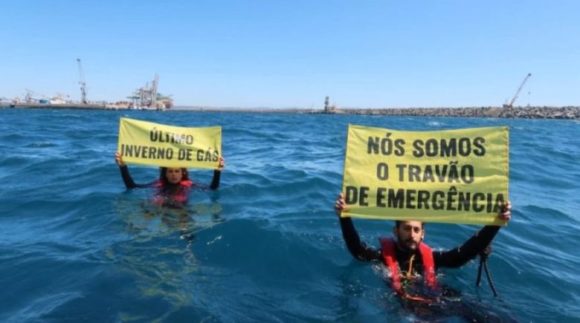
Disrupting the destructive systems that create these threats is essential for our collective survival. This brings us to the good news: all over the world, brave people are rising up to resist. Despite everything, people are committing themselves to a livable world for everyone. Social movements are not giving up and are holding on to each other. This combined strength is the only thing that can stop the destructive systems.
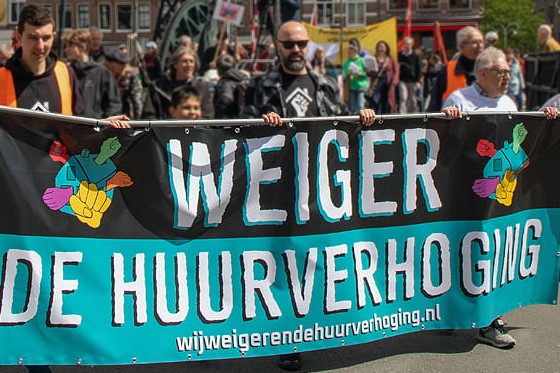
As a result, Het Actiefonds is seeing a growing number of requests for assistance. These come from activists who are themselves in difficult financial situations and yet make time to work for their community and against the systems that are destroying our planet.
For over 55 years we have stood against apartheid, for justice, and for solidarity. Because the freedom of one person is connected to the freedom of another. It is solely thanks to donors that we can contribute to global change.
Together with you, we stand with the people at blockades. For those who chain themselves to trees out of radical love for life. For the participants in mass demonstrations who raise a collective fist against structural violence. That’s why we are now looking for at least 500 allies to join Het Actiefonds. Most of our allies donate between 5 and 15 euros per month.
Rise up! Join Het Actiefonds!
For the first six months of 2023, the collective Alarm Phone had contact with as many as 539 boats in emergencies – roughly four per day. Alarm Phone tracks the territorial waters these boats are in, and then alert the Coast Guard to their responsibility to rescue people in distress.
CW: (Sexual) violence, death
On July 18, a day after Mark Rutte, Giorgia Meloni, Ursula von der Leyen and Kais Said clinked glasses in Tunis over their brand-new migration deal, Alarm Phone received the following report:
“We are not doing well. We were attacked by armed soldiers. Libyan troops shot at us, beat us up, and raped the women at night. I almost ran out of battery.”
The EU promised President Said as much as a billion euros as long as he ensured that people would no longer cross the Mediterranean illegally from Tunisia. The EU is happy to cooperate with a man who seized power only two years ago, and since then has accused black migrants of demografically replacing Tunisians in his speeches.
After all, it does not look good for the EU if hundreds of people a year drown in the Mediterranean Sea because of European regulations. Hence the deal with Tunisia. Couldn’t Said be so nice as to let migrants die in the desert instead of at sea? At least then it won’t be Europe’s responsibility anymore. If this deals result in fewer migrants on the Mediterranean, it should serve as a blueprint for similar deals with Morocco and Algeria. A situation that would greatly benefit the European right. They can then portray North Africans as vicious racists a few years from now without getting their hands dirty themselves. Indeed, they will once again present their own asylum policy as the epitome of humanism and civilisation.
Perhaps most blatantly, the deal is phrased as a humanitarian landmark. Tunisia will guarantee the human rights of migrants, European leaders vow, despite all evidence to the contrary. The report above is just one of many that Alarm Phone received this summer: and news of the hundreds of black migrants chased into the desert in July after a pogrom in Sfax reached every major European newspaper. Rutte and Meloni know who they are entering in business with.
Proponents of the deal nevertheless claim it is necessary to combat illegal human smuggling. It would all be for the safety of that migrant being whisked away by smugglers for a life-threatening boat trip. That the EU contributes to life-threatening escape routes by carrying out illegal push-backs is an uncomfortable but necessary side effect, according to proponents. After all, the Union prefers not to have drowning deaths in its own waters. How considerate.
If the EU is so concerned about migrant safety, why doesn’t it build a bridge?
For years, Het Actiefonds has supported the collective Alarm Phone, a group of volunteers documenting the crossing of the Mediterranean Sea. Migrants call Alarm Phone to relay their situation and location, upon which the collective verifies the waters they are in and thus who is responsible for their safety. In this way, Alarm Phone puts pressure on the relevant authorities to rescue migrants in mortal danger. In the first six months of 2023, Alarm Phone was in contact with as many as 539 boats in distress – roughly four per day.
Alarm Phone has since become a regular part of reporting on disasters in the Mediterranean Sea (and North Sea). For example, the organization was in contact several times with the overcrowded fishing vessel that sank off the coast of Greece in July, leaving hundreds dead and missing. Despite attempts by Greek authorities to cover up the affair or blame it on human smugglers, it seems that it was the Coast Guard itself that caused the ship to capsize. Apparently, Greek authorities tried to use a tow rope to drag the boat into Italian waters.
In the Mediterranean, truth is often an afterthought. Hence the importance of organizations like Alarm Phone, which record the facts while the are still happening. Whether European countries do anything with those facts in time is another matter. 90 percent of the emails that Alarm Phone sends to coast guards, detailing the location and status of boats in danger, go unanswered.
As a protest against the EU’s frosty attitude, Alarm Phone therefore read out 1338 emails to the European Parliament in late June with reports of boats in danger. There was also an Alarm Box present at the protest: an alarm that went off live whenever a new emergency was reported to Alarm Phone.
Alarm Phone is one of the few organizations that understands what is going on at the borders of Fortress Europe and identifies its crimes. Therefore, we are proud to once again support this group.
Image: Watch the Med – Alarm Phone
For years, Het Actiefonds has supported various actions on the occupied territories between the Jordan River and the Mediterranean Sea: from conscientious objectors to the recording and disseminating of colonial violence. Just as the most right-wing government in Israel’s history takes office, Het Actiefonds will continue to support those working for freedom and equality in occupied Palestine.
Since the COVID pandemic, Israeli anti-government protests have been a recurring phenomenon. First the protests were about Prime Minister Benjamin Netanyahu’s corruption scandals or draconian pandemic policies. Netanyahu risks 10 years in prison for corruption charges, so he is desperately trying to stay in power to retain immunity. To save his own skin, he even decided to form a coalition with Israel’s far-right parties after the last election.
This monster coalition is the target of the current protests in ’48 territory (which does not include the West Bank, Gaza and East Jerusalem). Many note the dangers of making so many concessions to the far-right religious parties. For example, far-right provocateur Itamar Ben-Gvir has been appointed head of the Israeli police in the West Bank. Multiple human rights organizations already describe the situation in the West Bank and Gaza as apartheid, but if it is up to Ben-Gvir, the colonization of the West Bank is not moving fast enough. He is regularly seen at such sensitive sites as the Temple Mount and Hebron, holy sites for the religions of Abraham, declaring that the area belongs only to Jews.
Additionally, 2022 made for an especially deadly year in the region. 144 Palestinians were killed by the Israeli state in the West Bank alone, the highest number since the Second Intifada of 2004. Meanwhile, 31 Israelis lost their lives to Palestinian resistance fighters, the largest number in seven years.
But increasing violence in the West Bank is not the sole cause for protest. Current demonstrations in the ’48 territory are largely about the attack on the rule of law. The new government wants to make the weak separation of powers in the Israeli state a thing of the past.
The new government’s most controversial plan is to give a minimum majority in parliament the power to override Supreme Court rulings. In practice, this means that the government no longer has to listen to the court, and can introduce laws that go against Israel’s constitutions. The result is unbridled power for the government, which no longer has to answer to anyone. In addition, the government wants the exclusive right to appoint lawmakers and judges, further subordinating the legal branch of the state to politics. Israel risks becoming an illiberal democracy because of the government’s new plans, following the example of Poland and Hungary. The destruction of the justice system may keep Netanyahu out of jail, but it will certainly further isolate the state.
As such, tens of thousands of people are taking to the streets in Tel Aviv, Haifa and other cities. Most of the protesters are doing so out of nationalist sentiment. For example, one lawyer told the Israeli newspaper Haaretz, “my late grandmother came to Israel in 1922 to establish a state. These days they are trying to destroy her life’s work, and I am trying to not let them succeed.”
Still, the demonstrations to protect Israeli democracy must be a strange sight for Palestinians. Those with Israeli passports have endured a tyranny of the majority for decades. Their interests do not align with the vast Jewish majority in ’48, giving them little political power. In East Jerusalem, the West Bank and Gaza, Palestinians do not even have the opportunity to vote.
In 1945, Black American author Zora Neale Hurston wrote the essay “Crazy for this Democracy,” whose opening lines must still sound painfully relevant to Palestinians:
“They tell me this democracy form of government is a wonderful thing. It has freedom, equality, justice, in short, everything! Since 1937 nobody has talked about anything else (…) The radio, the news papers, and the columnists inside the newspapers, have said how lovely it was. All this talk and praise-giving has got me in the notion to try some of the stuff. All I want to do is to get hold of a sample of the thing, and I declare, I sure will try it. I don’t know for myself, but I have been told that it is really wonderful.”
Maybe Israeli democracy will survive this government. But the country’s fundamental problem remains untouched. A colonial situation is unsustainable, and sooner or later, whether peacefully or violently, it must come to an end.
Jewish-Tunisian author Albert Memmi described the unsustainable colonial situation in The colonizer and the colonized (1957). According to him, the colonial system robs both the colonizer and colonized of their humanity. The colonizer becomes ruthless and racist because of the system. He/she/they must humiliate the colonized, deprive him/her/them of their past and future and deny them their culture and right to life. The colonized, on the other hand, has no chance to become a full human being in a system that stifles their agency as much as possible.
It is on behalf of both Israelis and Palestinians that the colonial system must be dismantled. Any peace process is a joke as long as it does not meet this first fundamental demand: an end to apartheid, an end to the colonial system.
Image: Haggai Matar / +972 Magazine
More than a year ago, Het Actiefonds supported the occupation of Lützerath. The German village was in danger of being wiped off the map so that coal giant RWE could continue digging for lignite in the Rhineland. Sixteen months later, Lützerath is still on the map, but excavators are approaching the village again.
Anyone who traverses the German Rhineland by car can marvel at the huge craters that dominate the landscape. The holes are so deep and large that for a moment you imagine yourself on another planet. The driver sees only dust and stone as far as her gaze reaches. The Garzweiler mine, for example, has an area of 48 square kilometers, twice the size of the municipality of Leiden. And that’s not even the largest. Right next door is the Hambach mine, with its 85 square kilometers one of the largest lignite mines in Europe.
Together, these two mines are already responsible for 75 million tons of CO2 emissions per year. By comparison, that’s about half of the Netherlands’ annual emissions. Half. And if it’s up to the energy company RWE, that number won’t go down any time soon.
Eckhardt Heukamp was already the last resident of Lützerath in September 2021: the other residents had been bought out or left. Yet Heukamp refused to leave the land on which he had grown up. Through a long campaign by climate activists, Heukamp and hundreds of activists managed to postpone the destruction of the village for more than a year!
But today, German police began evacuating the village. Let that sink in for a moment: the German state sends police to remove citizens from their own land so that an energy company can make even more profit from outdated fossil fuels. A police force, which, by the way, is funded by the taxes of German citizens and not those of the tax-dodging RWE. Last night the police have already cleared 200 activists. An equal number is still at the scene.
Nigerian climate activist Peter Donatus sees the same politics in the Rhineland as in the Niger Delta: “It is the same methods and the same multinationals working to destroy the environment around the world.” He advocates climate justice. Donatus: “Climate justice is a concept from the Global South, born of necessity. I am happy to see young European activists adopting our concept, but then they must also be able to see from our perspective.” Racism in the climate movement remains, he observes, “we still have a long way to go.”
The renewed interest in the ground below Lützerath comes from the energy crisis Germany has been in since the Ukraine war. More than half of Germany’s natural gas was imported from Russia. To become more energy independent, the government has pledged to keep some nuclear power plants running longer, as well as to mine more lignite. The Greens, one of the current ruling parties, defend the end of Lützerath by pointing out that in exchange for this area, the Garzweiler mine must close eight years earlier, in 2030.
But climate activists are not impressed by this argument. They claim that the Greens have been guided by erroneous calculations by RWE itself. Politicians should have commissioned independent research into the costs and benefits of Lützerath earlier. That would have shown that it makes little sense to destroy a large area of land for a few years of coal extraction. That is, if it stays at just a few years: the history of climate goals teaches us not to take promises from energy giants so seriously. It’s about the first thing polluting companies ask for: pollute more now, in order to suddenly be completely sustainable in the future. So far, no one has successfully performed this magic trick.
The end of Lützerath might be near, but the climate battle in the Rhineland has proven effective time and again against RWE. Like the Hambach Forest before, Lützerath has quickly become a symbol of the struggle against energy companies, profit-oriented thinking, and disastrous geopolitical games. Hambi stayed! Lützi stays too!
Het Actiefonds supported various protest groups in Myanmar at the time of the coup. An activist tells anonymously about her experiences. Born in Kachin State, she currently works part-time at a small think tank organization in Yangon. Both through her work and on a personal level, she is connected to the protest movements.
Unity
“You could describe the currrent period in Myanmar as very hopeful, but at the same time most grim. Never have I witnessed my country in such a united front against the military. Only now do I really understand the struggle of ethnic people and their grievances. It was only when the country was shattered to pieces by the military for the third time in history that we finally found the unity we need to build a federal union.”
Strength of a young generation
Despite a glimmer of hope, the future remains hugely uncertain: “I am very concerned about how the situation will unfold in the coming months. The war that the NUG (National Unity Government of Myanmar) declared on the Myanmar military might not lead to a fullblown war, but it will make life very difficult for Myanmar’s working people. There is already a civil war on a large scale in the countryside. Hundreds of people are displaced without receiving any aid. At the same time, the military is breaking down the PDF movement (People’s Defense Force) in urban areas very rapidly. The situation resembles that of David and Goliath; it is amazing to see the unbroken spirit of young people who are sustaining the movement.
Long struggle
When asked what it is like to be an activist in such an environment, she emphasizes the importance of cautiousness: “You have to be very careful, both with online and offline activities. It’s going to be a long struggle. Most importantly, you don’t get arrested or killed. I don’t think you can be an overt activist in Myanmar right now – not if you live in the country itself. Every movement is tracked, your telephone communication, your online activities, your mobility, your bank transitions…
Het Actiefonds continues to support the protest movement in Myanmar and maintains close contact with activists. “I think we are all traumatized in one way or another. I really hope the young generation finds peace very soon. I hope we can all heal.”
More than half a year ago a coup attempt sparked a wave of protests throughout the whole of Myanmar. We spoke to human rights activist Igor Blaževič about the situation in Myanmar, where has worked and lived for five years. Igor was leading the Educational Initiatives, an educational training program for activists.
So what is your connection to Myanmar?
“When the coup started, I immediately reconnected with friends and former students in Myanmar. I lived and worked there from 2011 to 2016; about three hundred activists took part in courses I organized on transition to democracy. They are all in action now, organizing protests and other actions, risking their own lives.”
“Among Educational Initiatives participants were activists who spent half an hour on a demonstration and then spent ten years in prison for that. They never received normal education at that time; others, coming from ethnic minority areas, are the children of ethnic cleansing, young people who saw their villages looted and destroyed. The main aim of Educational Initiatives was to bring people together from different political and ethnic backgrounds. Building bridges, making connections, that’s what it was all about.”
Can you describe what exactly happened during the coup? Why did people take to the streets so en masse?
“It is actually very simple and at the same time very tragic. What happened in short: General Min Aung Hlaing was supposed to retire this year: yet he wanted to become president at all costs. The elections showed that the incumbent NLD party would win again and that USDP, the military proxy party doesn’t stand a chance. In response, the general staged this coup.”
“But Min Aung Hlaing made a mistake. He never expected this huge nationwide wave of protests. The entire population revolted and the army responded with extreme violence. Nonviolent protests were brutally crushed. However, nonviolent protest flashmobs still happen every day, again and again, for six months already. The coup and the brutal violence still did not manage to break the spirit of resistance.”
And now?
“The military uses violence and power to extract any available economic assets. They have plundered all natural resources. From their stronghold, they continue to attack the population, hoping they can break their morale. The other side – the protesters – keep holding on. They continue to resist in every way possible: flash mobs, boycotts, refusal to pay for electricity, noise demonstrations, jungle guerrillas. The economy has collapsed and a civil war is imminent. There is no extra oxygen for people with COVID-19.”
What can you tell about the social movements in Myanmar? Is it even possible for activists to organize themselves?
“At the moment there are many different active groups. Large and small streams forming one strong river current of resistance. The younger people are perhaps the most important, generation Z. They are currently organizing a lot of flash mobs. Many activists are hiding, but they have good networks and use Telegram, Signal and social media to announce and mobilize for actions. They also take a lot of photos and videos and send them out into the world as much as possible. And then there is the neighborhood movement: local residents organize night vigils, walk marches during the day, organize street theater and they too document as much as they can. In very remote villages, the villagers are taking action by crossing rivers with boats and banners. Even Buddhist monks are involved in the resistance. A good example of creative direct action is the coconut protest: streets strewn with coconuts with various cries of resistance.”
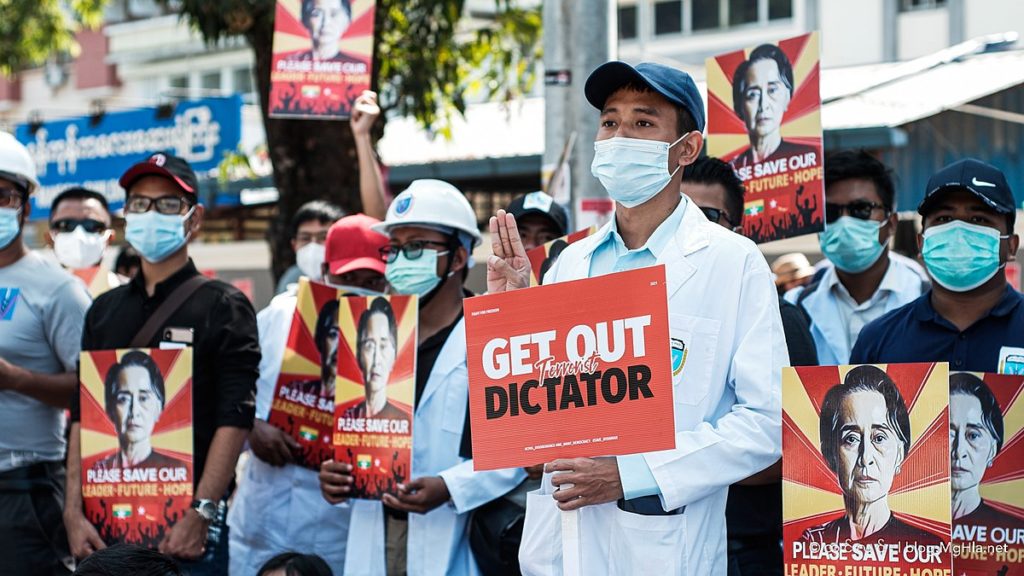
But those protesters risk their own lives by taking to the streets. How do they deal with that constant threat?
“Min Aung Hlaing has done something from the ‘cookbook’ of terrorist dictatorial regimes: the military deliberately organizes extremely brutal killings to break morals. It is ensured that these murders are extra visible; this is a tactic, it’s part of a strategic plan. They are aware that the most brutal images will circulate on social media. The goal is to instill fear.”
“But the movement cannot be suppressed. Activists, meanwhile, are aware of this manipulative tactic and have stopped sharing horrific images. Instead, they turn the victims into heroes and spread their story. To encourage fellow activists, not to spread fear and panic.”
What are the effects of grassroots activism in the region?
“I see two amazing results. The first is: mobilization. An entire nation rises. The general may have expected a few protest movements, but we see that the courage of a few people has finally mobilized an entire community. The second is that a protest movement has risen against military power. And for six months (!) the army could not break this resistance!”
“Still, they cannot prevail over the military and armed forces. They need help. From neighboring countries and from the international community. But this urgent assistance is not coming, except from organizations such as Het Actiefonds. We need major international players to end this power game.”
How do you see the future for Myanmar; politically but also specifically for the protest movement?
“There are a few scenarios. One is that the some big international players like Russia and China continue to stand behind Min Aung Hlaing, and other international players like US and EU do too little. Regional players like ASEAN remain passive and ineffective. Then the entire protest movement could be stopped in the end… More probable is the entire collapse of the state. A third scenario is that neighboring countries – along with key international players such as the US and the UK as well as China and India – realize that Min Aung Hlaing is not the solution for the country. Then there might be enough pressure to trigger a counter coup. Maybe then there will be a chance to breathe new life into the country, because change is possible!”
“A cynical outlook is that the military will always win over the people. On the other hand, there is still hope. True, Goliath often prevails, but not always. David also wins, sometimes. And as long as that David is there, there is hope. It is now important that we stay in touch with the people of Myanmar, those who risk their lives and continue to struggle. Networking is so important! Get to know each other, keep talking to each other. Building and coordinating an international network is indispensable. We must unite!”
Igor Blaževič is a human rights activist and founder of Europe’s largest human rights film festival. He was born in Bosnia in 1963. When the war broke out he was already living in Prague, but this event changed his way of thinking. He became an activist, focusing on helping activists in dictatorships. Currently he is a program director at Prague Civil Society.
Great unrest broke out in Belarus last year. A revolution seemed imminent. After President Alexander Lukashenko won the elections again, people took to the streets en masse to protest. The population demanded his resignation: never before have so many people protested in this 26-year-long regime.
Het Actiefonds supported various action groups that continued to fight at the risk of their own lives against the oppressive regime of this dictatorial leader. We spoke to an activist who wishes to remain anonymous, from a small town in eastern Belarus.
Can you briefly describe the situation in Belarus before the elections in 2020?
“Even before the 2020 presidential elections, the situation in Belarus was very tense. Society practically choked on the anti-Belarusian politics of Alexander Lukashenko! All his actions are directed against Belarus; he is only concerned with the interests of Russia. Both in Minsk and in my own province, in an extremely remote and isolated part of the country, there were demonstrations in support of Svetlana Tikhanovskaya.[1] All residents wanted change.”
“We saw the whole country straightening its shoulders, as it were, to shake off the Russian tyranny. And the epitome of that is the bloody dictator Lukashenko. The society of my region finally realized that we have the opportunity to change the situation. We all went to the barricades!”
“It is difficult to say why the situation was so different now from previous elections. After all, all the previous ones were kept in the same way: literally all protocols (from district committees to the CEC[2]) were forged in the most incredible ways.”
Can you tell us about your activism?
“‘Group of Likeminded Initiatives’ is an organization of like-minded people committed to positive change in communities in the region and its suburbs. The main target group consists of young people and local residents whose human rights are being violated. Main activities are activating and mobilizing young people, protecting human rights, providing information and various local cultural projects.”
When the election results were out, how did you feel?
“The election results in August 2020 were not much of a surprise to us. The results have always been falsified: not a single stage of the election has been fair since 1996. All members of the Election Commissions are appointed in Belarus by government authorities. The commissions therefore work on behalf of the government and falsify everything, always, for the full 100 percent.”
“But what did come as a shock was the unprecedented beatings and torture of protesters and opposition supporters by the Interior Ministry and other security forces immediately after the results were announced.”
How did Het Actiefonds help you?
“Immediately after the elections, we were greatly helped by Het Actiefonds. In the support of Het Actiefonds we saw the face of European solidarity! And not only in our own region, but also surrounding communities received support for their activism. So yes, the help we received from Het Actiefonds at the time was incredibly significant for our protests.”
We know that a few weeks after the protests, people started to lose their strength and courage. Can you describe what happened? What was the repression you faced?
“It is very difficult for people outside the former Soviet Union to understand what real repression means. But here are a few examples:
1. Losing your job. This is a terrible consequence, especially in small villages where it is almost impossible to find a job. Teachers, workers… Suddenly they can no longer provide for their livelihood. In my own region as many as 150 people lost their jobs. They are on special lists of the Ministry of the Interior or the KGB. Many of them were forced to leave for Russia. Why Russia? Because it is impossible for them to go to Poland or Lithuania. These and other Eastern European countries do not welcome oppressed Belarusians.
2. Suspension of universities and other higher education institutions. This is often followed by forced military service of 1.5 years. In my village, 27 villagers were suspended and sent to the army.
3. Fines. And the amount exceeds your wildest fantasies… An example: the fine for participating in a protest can be up to 1.500 euros. A monthly salary in the city is 250 to 300 euros at most.
4. Deprivation of liberty. The maximum prison sentence ‘to pay for freedom’ in Belarus has now risen to 18 years. I think no further comment is needed here.”
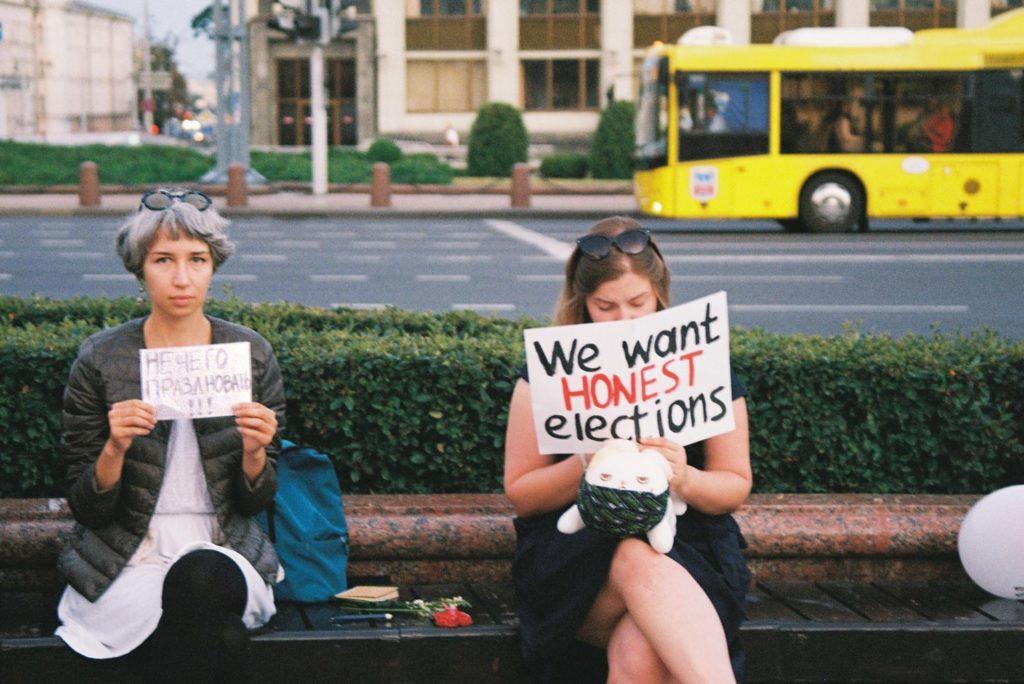
How are you now? And how is the rest of the situation now for you and your fellow activists? Are people still planning new actions?
“How am I now? I have been arrested twice for 10 days since August 2020. I was beaten up by KGB agents. I am currently under criminal investigation under Article 342 part 1 of the Criminal Code (‘organization or preparation of actions seriously violating public order, or participation therein’). I have no idea what my status is. My house has been searched and I am now awaiting arrest.”
“My citizen passport was taken by the KGB. I’ve been out of a job for a long time – I’m a history and socio-political studies teacher (in the past). I used to be an entrepreneur too. However, in the early 2000s, three of my businesses were ruined by the authorities. My wife was also fired because of me…”
“Now my whole family (my wife, son and daughter and myself) makes a living from my nighttime security and unofficial construction work. My wife, a former school principal, does cleaning work for wealthy residents in the village. What can I say about other activists? Their situation is about the same. Many of them have lost the ability to feed their families. There is a massive migration to Russia. And I haven’t even mentioned the people who have lost their freedom…”
Do you often experience a feeling of powerlessness? And what do you do then, how do you keep up the courage?
“I actually feel powerless all the time. I returned to my hometown in the late 1990s. My goal was to make the life of the villagers better, more organic. But since my return, I started to feel more and more powerless. I was always aware of what was happening in Belarus. Lukashenko’s inhumane, anti-Belarusian activities were clear to me. Everything he did was in the interest of Russia. My beloved Belarus slowly turned into Russia… What did I do then? Everything I mention above! And how do I keep up the courage? Lately I can’t do it anymore. My friends and I are all in a state of panic. We now see the consequences of what is happening: Russia is swallowing our country. As a historian I must say that this has of course happened before Austria, Czechoslovakia, Lithuania, Latvia, Estonia, and so on. And as then, Europe is again doing nothing to save Belarus.”
How do you see the future for Belarus? And the future for action groups there?
“Fighting the dictatorship in Belarus is not exactly a rewarding activity. But of course we will continue our work, we will continue to fight against the bloodthirsty Russia and her bloodthirsty personification, Lukashenko… I am sure that ‘Luka’ would have been overthrown by the Belaruss long ago, had it not been for the Russian dictator standing squarely behind him . I am afraid that the situation in Belarus can only be changed if we change the situation in Russia.”
Het Actiefonds remains in close contact with activists in Belarus and stands in solidarity with protest movements worldwide that are suffering from repression.
[1] Svetlana Tikhanovskaya is a political activist and opposition leader. She lost the election, but continued to call for mass peaceful protests from Lithuania. In her own words, she never aspired to the presidency; its goal was to achieve fair elections and a free democracy.
[2] Central Economic Commission
In August last year, Het Actiefonds supported a mass action by Bündnis Rheinmetall Entwaffnen to block the war industry in Kassel, Germany.
Activists from environmentalist, antifascist, queer, feminist and peace movements all participated in the blockades against a large arms factory in Kassel.
“The blockades of the arms factories of Rheinmetall and Kraus-Maffei-Wegman in Kassel started in the early morning. Production came to a standstill. It was communicated to the workers that the blockades were not directed against the employees, but against arms production. The demand to stop arms production in Germany and elsewhere includes the demand to create equal and meaningful jobs.”
After the successful blockade, the different groups then formed a spontaneous demonstration. A recap of the successful, disruptive day of protests has been made, watch it below!
Malawian organization Zenith for Young Women Achievers campaigned with to legalize abortion. Although public debate was sparked in on- and offline media, the government indefinitely postponed to vote on new abortion laws.
The majority of abortion procedures in Malawi are performed under clandestine and unsafe conditions. Complications from abortions have been estimated to account for between 6% and 18% of maternal deaths in Malawi. Abortion is only legal in Malawi to save a woman’s life. A national debate is currently being held on whether or not to liberalize Malawi’s abortion law by providing more exceptions under which an abortion could be legally obtained.
Zenith for Young Women Achievers, together with other organizations, organized a public campaign to discuss and pass the new Termination of Pregnancy Bill. More than 3000 young women and girls in Blantyre and other cities in Malawi participated. The campaign included a solidarity walk in support of members of Parliament, so that the bill can be discussed and passed before the sitting of parliament on October 23rd, 2020.
The organization reflected that the campaign has been successful in igniting a conversation to change the public debate around the bill. The campaign captured the media attention it deserved and members of the general public discussed the bill on social media platforms, radio and television programs. Consequently, many Malawi are aware of the need to deal with unsafe abortion by having legislative and policy reforms. It has not been a complete success, however, because Parliament did not deliberate the bill and the National Assembly has been indefinitely adjourned.
Zenith commented that there is a strong need for mindset change of Malawians on the effects of unsafe abortion. Currently, religion is being used to curtail discussions around the topic, on the back of ideas such as that those dying from unsafe abortion are sinners. This frame of thought is directly resulting in deaths, but on top of that, a lot of resources are being lost treating post abortion complications. The proposed legislative reform will thus protect girls and women directly, but also prevent complications and release pressure on the health care system.
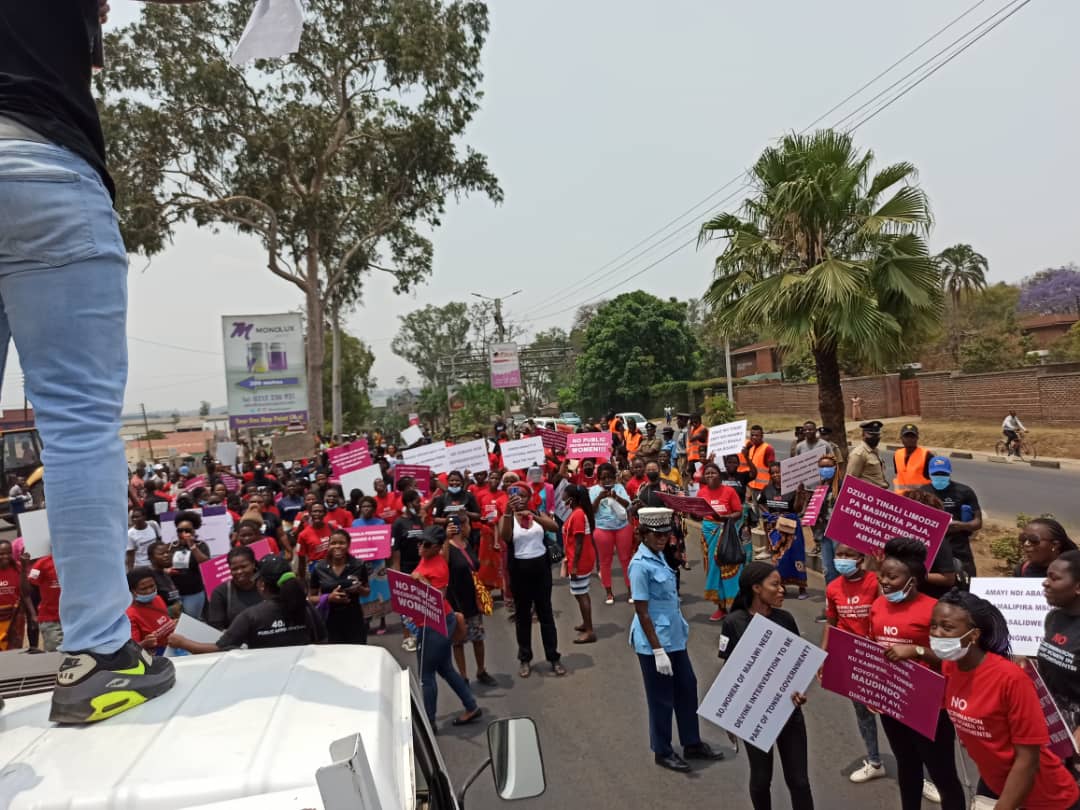
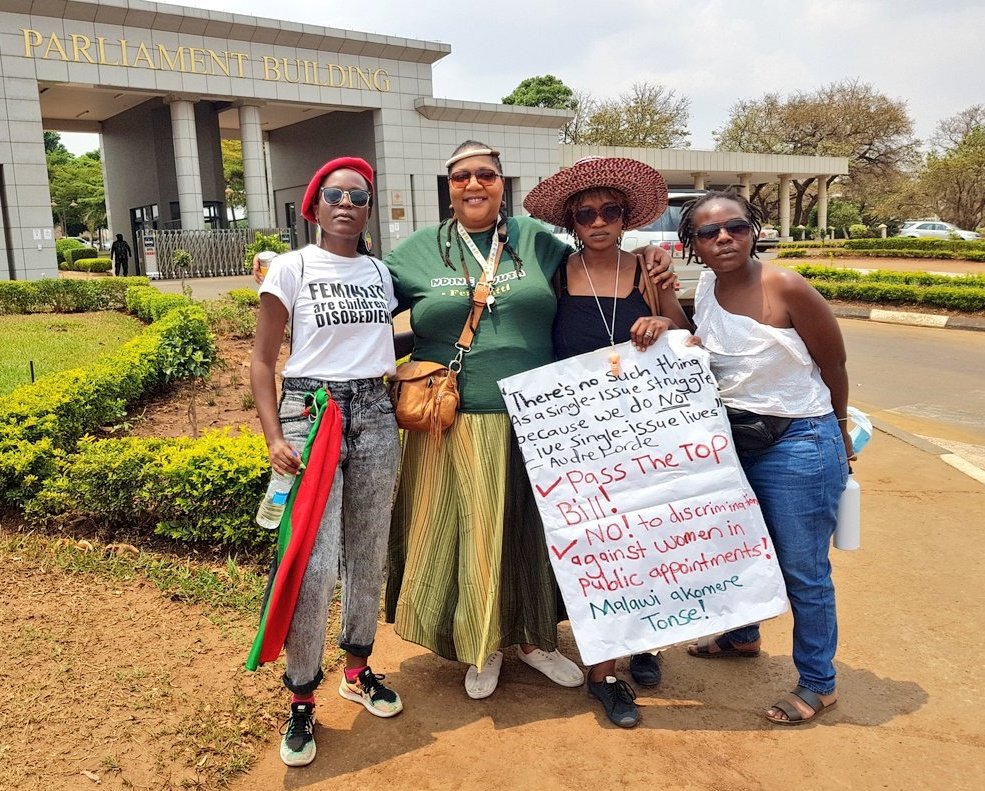
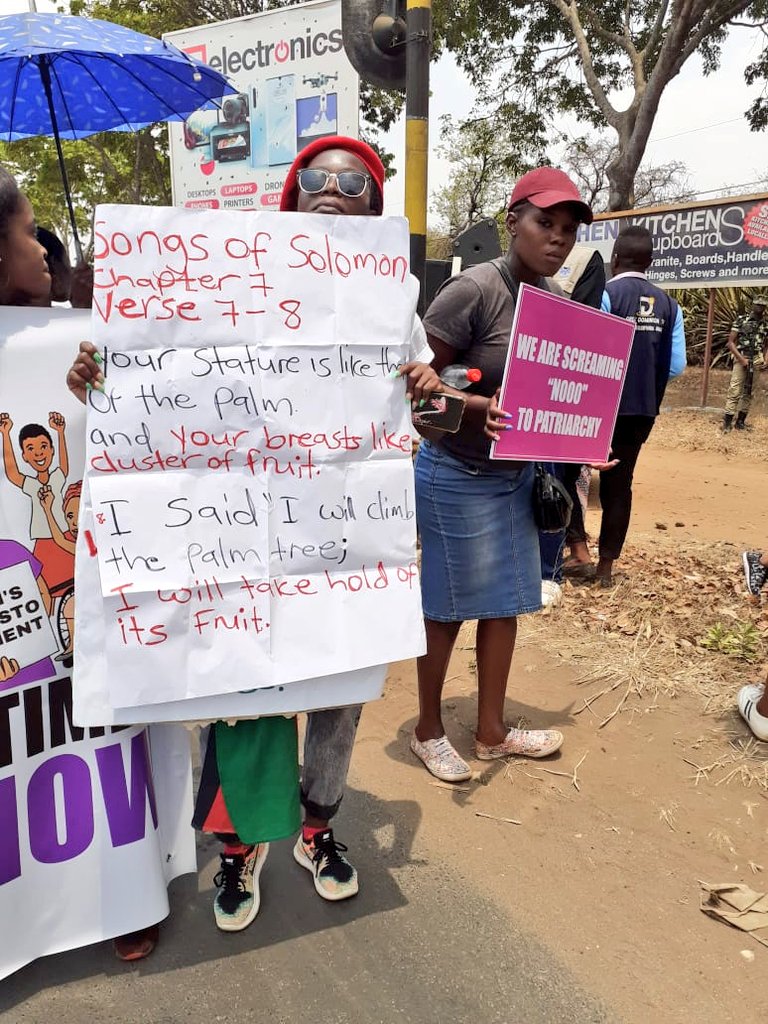
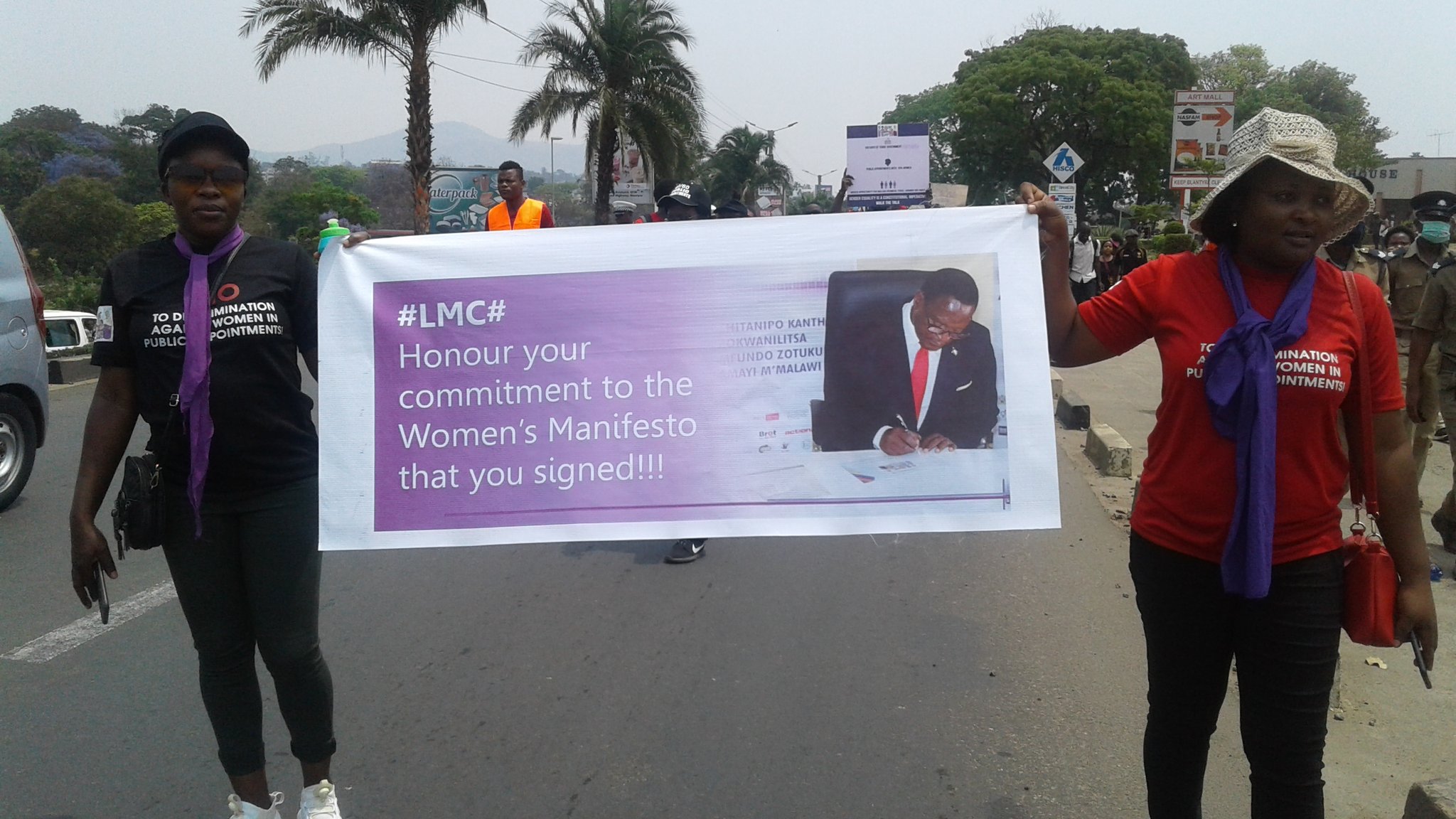
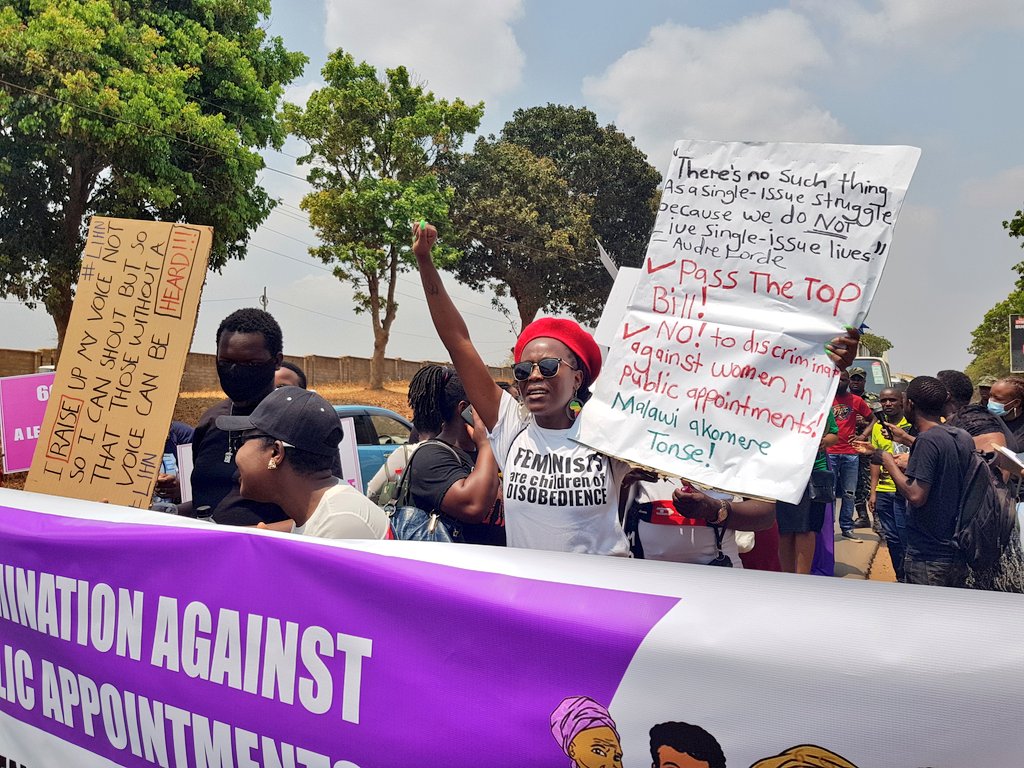
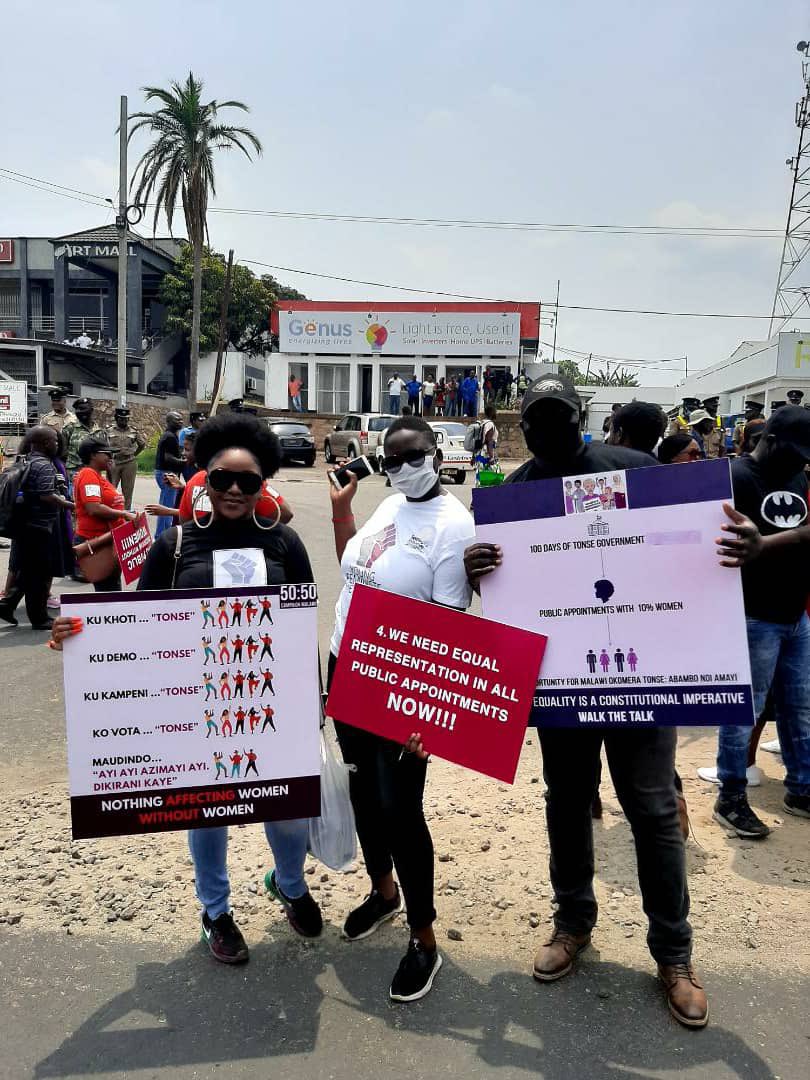
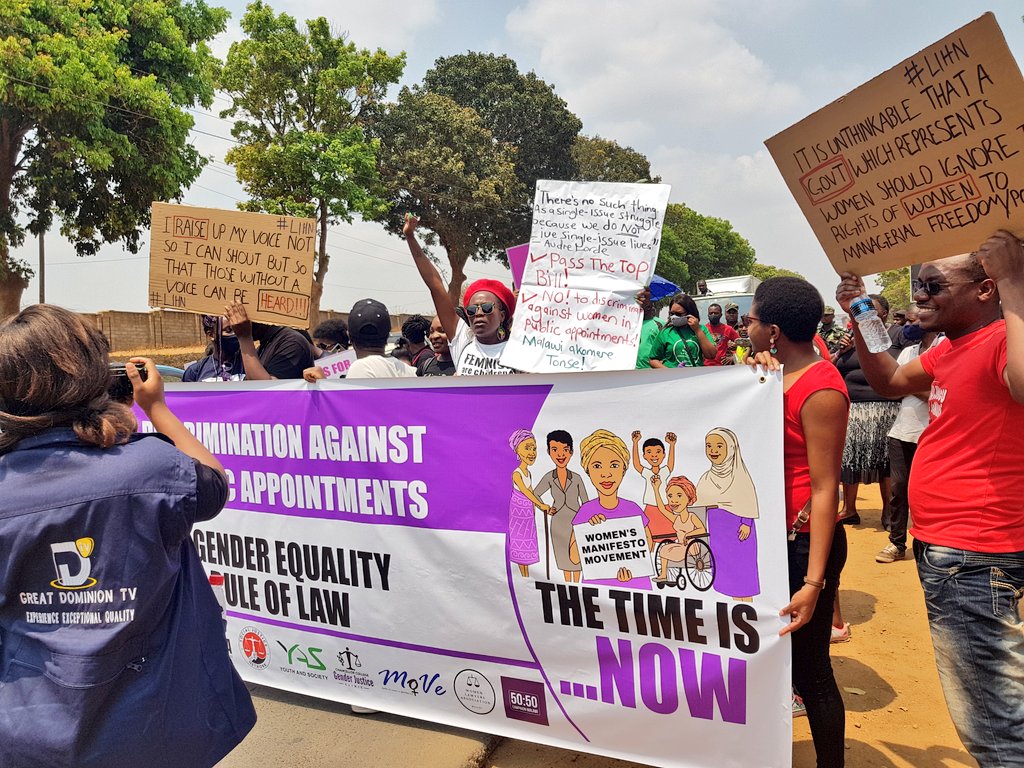
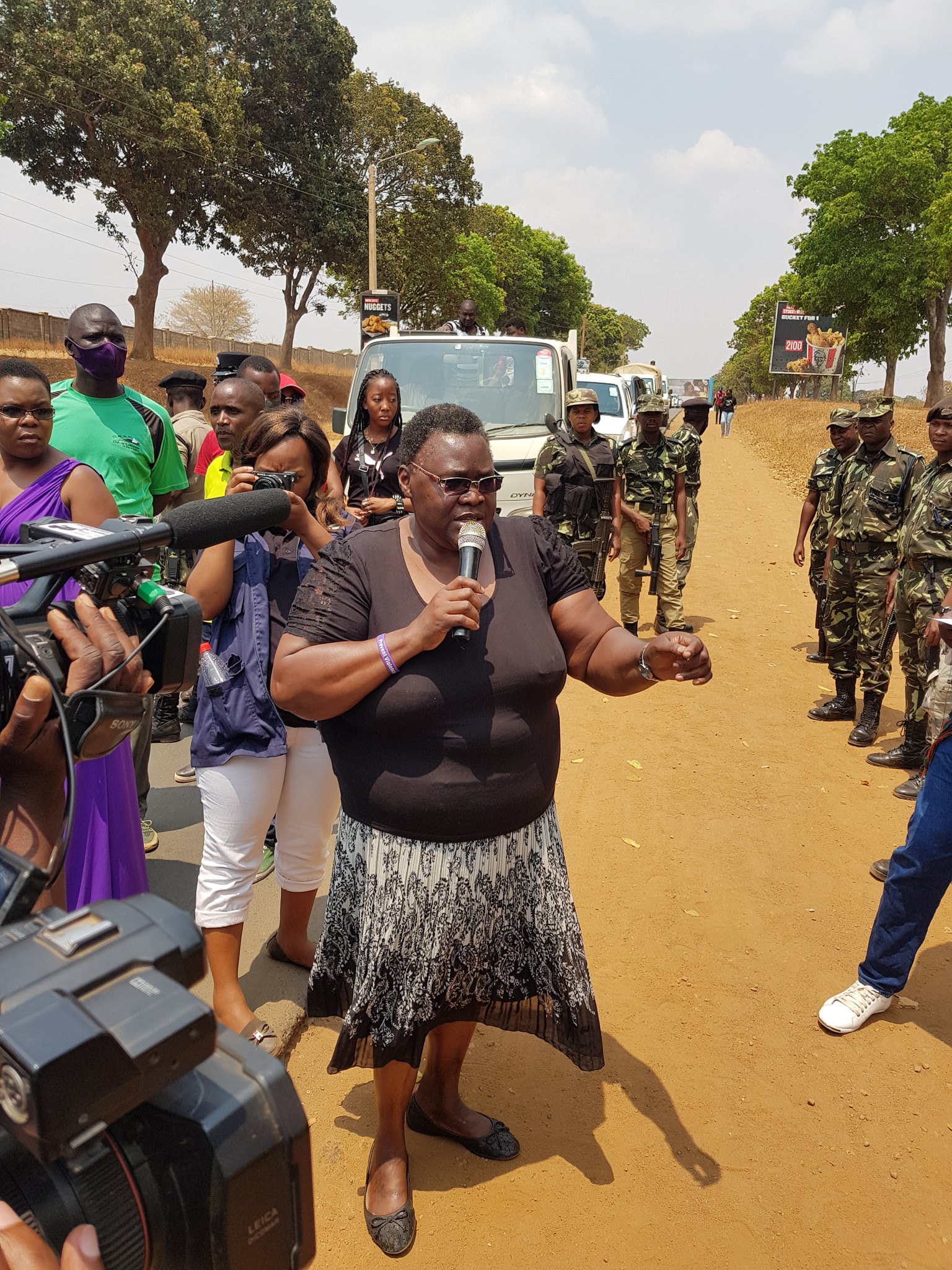
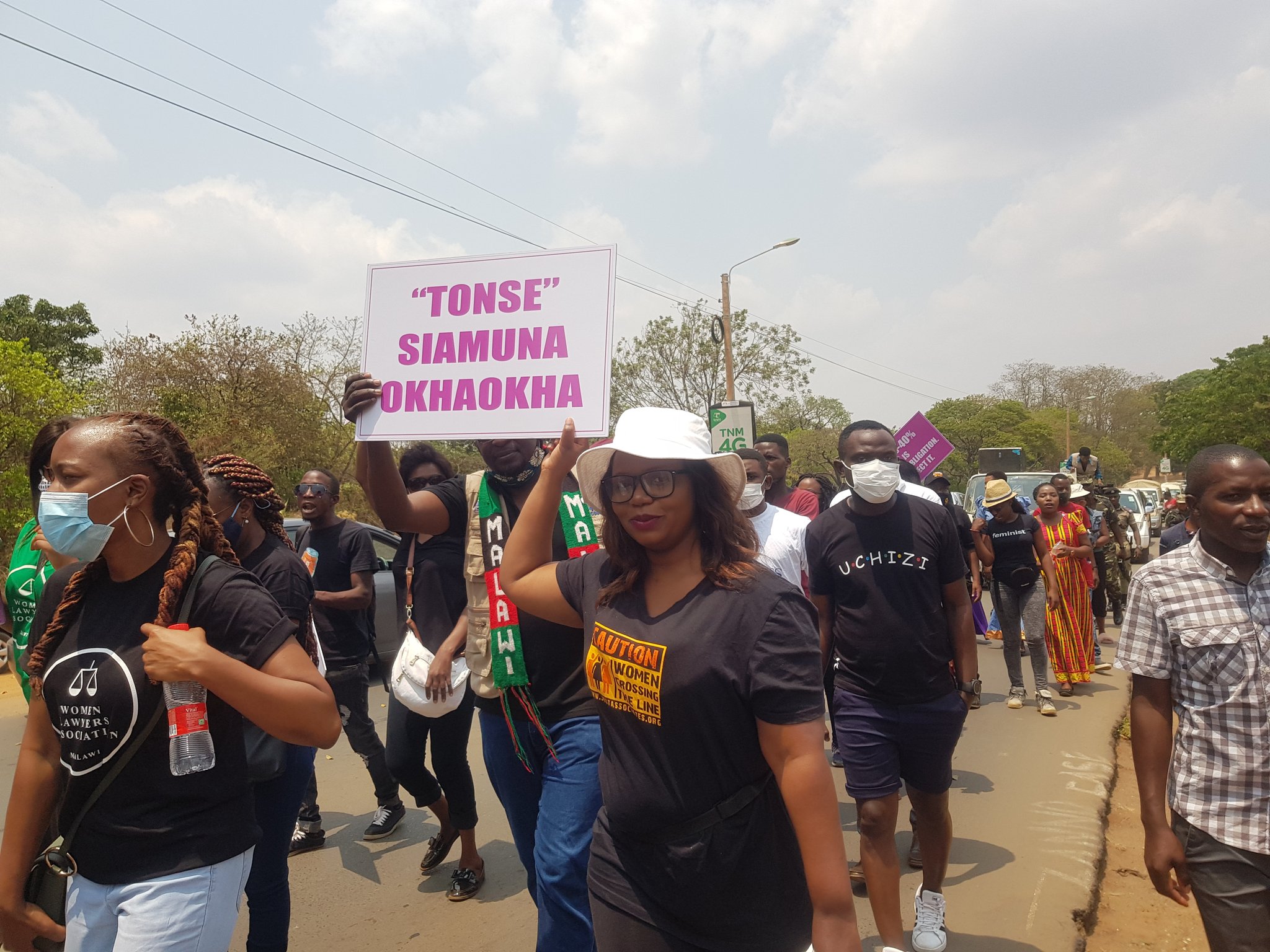
Following earlier actions against the unsafe living conditions for the LGBTQIA + community in the Kenyan refugee camps, action group Community Support Initiative for Refugees (CoSIR) once again took action to ensure the safety of the group.
Unsafe situation
“The police had failed to guarantee the safety of the refugees and had therefore decided to move them elsewhere. But the camps where the refugees were taken were the same ones they had fled a few months earlier. After a few extremely violent incidents, the organization had indicated once again that they could not guarantee their safety.”
CoSIR once again organised a protest to force UNHCR Kenya and the government of Kenya to end the inhumane encampment policy for all LGBTQIA + refugees. After the protest, a petition was filed with the Commissioner Refugee Affairs Secretariat (RAS) and the Head of Protection and Asylum at UNHCR. Due to the COVID-19 outbreak and subsequent government security measures to prevent the spread of the coronavirus, communication with RAS and UNHCR has been rather difficult. Nevertheless, CoSIR expects a definite answer soon about the measures to be taken to improve the situation in the camps.